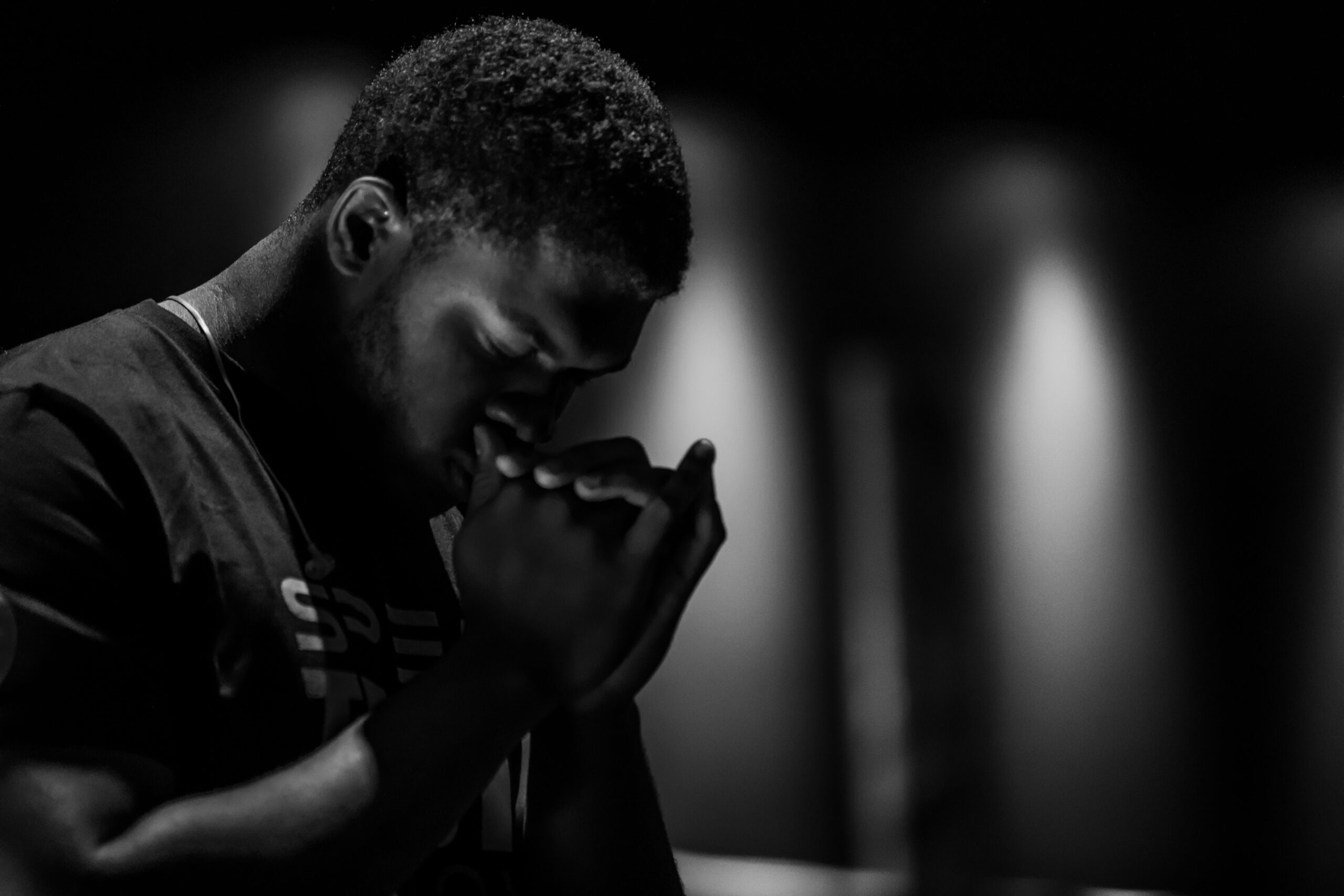“Rejoice With Trembling:” The New Covenant Theology of Fear
Is it not an oxymoron to command people to rejoice with trembling? Yet that was the command the Psalmist issued to the kings of the earth who rose up against the Lord’s anointed (Psalms 2:1-3). Knowing who the Lord is and what he has declared concerning his anointed (verse 4-8), these kings were to repent, serve the Lord with fear, and rejoice with trembling (verse 10-11).
When I talk to believers about the importance of awe and reverence in worship (and why liturgies are important in worship), some of them discount the place of such language, believing that the realities of the new covenant means the focus of worship should be joy and gladness.
For many believers, Christianity should be all about rejoicing in what God has done (and manifesting that joy in singing and dancing, with some ecstasy to go with sometimes). For such people, any talk about the fear of God can be ignored based on 1 John 4:18. Hasn’t John told us that perfect love casts out all fear?
But the Bible teaches that the fear of the Lord is the beginning of wisdom (Proverbs 9:10) and that it is pure and enduring forever (Psalms 19:9). Infact, one of the eschatological hopes of Israel is that all the nations will fear God (Psalms 102:15).
But does this call to fear God translate to the NT?
The fear of God and the call to perseverance
In Romans 11, Paul was explaining why some of the Jews in his time rejected the gospel. He taught that while all the Jews were the physical descendants of Abraham, not all of them were spiritual descendants.
Though some of them were part of the covenant community, they didn’t have the faith of Abraham and like branches, they were broken off from the tree. But when these unbelieving Jews were broken off, Gentiles were grafted into the olive tree. Even though they were not physical descendants of Abraham, they had faith (Romans 11:17).
However, Paul warned, the Gentiles should not become proud and think that they were superior to the Jews who were broken off. Instead of becoming arrogant, they should fear (KJV, ESV; NIV has tremble) because the holy and righteous God who did not spare the unbelieving branches (even though they were natural descendants of Abraham) won’t spare Gentiles who do not persevere in the faith (Romans 11:18-22).
Paul here is calling on believers to fear and tremble lest they be cut off from the olive tree of covenant identification with Abraham.
The author of Hebrews makes the same point. After explaining that God’s eschatological rest is still readily available, he calls on the Hebrew Christians to fear lest by unbelief they deprive themselves of that rest. The NLT uses the word “wary” in place of “fear.” The author is calling on believers to fear or be wary that they don’t fall short of God’s rest due to unbelief.
This call to fear and be wary is more understandable when we read Hebrews 6 and 10. In both passages, the author explains that those who have identified with Christ (by becoming members of his covenant community) who then fall away cannot be brought back to repentance. The only thing that remains is definite judgment, the “raging fire that will consume the enemies of God” (Hebrews 10:27).
In light of the judgments coming upon those who were once members of the covenant community and then fall away due to deliberate sinning, the author admonishes believers to fear and be wary.
Peter also gave similar admonition. He reminded his audience that the God we serve is one who judges each person’s work impartially. Given that we have such a God who will judge our works without partiality, we are to live out our time in this world in reverent fear (1 Peter 1:17).
All of these passages teach that given the holiness of our God, who will cut off unbelievers in the covenant community, judge those who by falling off and continuous deliberate sinning show themselves to be false brethren, and weight every man’s work in the final judgment, we should live our lives with fear and trembling.
This fear and trembling results from our understanding of what is at stake. Unbelief and false faith will result in eternal punishment even for those who are members of the covenant community. Being a member of a church is no guarantee of true faith and all who do not have genuine faith will be destroyed. Those who have genuine faith bear fruit and persevere.
Therefore, knowing the holiness of God, the judgment he has promised against unbelievers, and the fact that church membership is not an absolute evidence of true faith, every Christian (church member) should fear and tremble. We should fear and tremble lest we are the shallow soil, the soil along the path, or the one among thorns (Mathew 13:3-9).
This is what Paul means when he admonishes that we examine ourselves whether we are in the faith (2 Corinthians 13:5). The possibility of false faith even in the covenant community should lead us to examine ourselves whether our faith is genuine.
Fear, trembling, and the fruits of faith
One way true faith manifests itself is in its fruitfulness (only the good soil produced a crop). We must examine whether our faith is a living (true) faith that bears fruit or a dead (false) faith that is barren (James 2:14-26).
And with an understanding of how high the stakes are, Paul, Peter, and the author of Hebrews call us to fear and tremble.
No wonder Paul calls us to work out our salvation with fear and trembling (Philippians 2:12). What does this involve? It involves doing God’s good pleasure (verse 13), which is an evidence of genuine faith.
We must do this with fear and trembling because only hearts that have been regenerated by God’s spirit can do his good pleasure. Consequently, we must fear lest we are still in the flesh, covering our deadness with religious cologne; we must fear and tremble, examining ourselves whether we have a new heart that is made after God in righteousness (Ephesians 4:24).
Paul said something similar in 2 Corinthians: “Since we have these promises, beloved, let us cleanse ourselves from every defilement of body and spirit, bringing holiness to completion in the fear of God” (7:1)
The pursuit of holiness is a serious affair, it is what distinguishes false and true believers. This is why Paul insists that no one will see God without holiness (Hebrews 12:14). Therefore, believers must pursue holiness in the fear of God not only because God is holy (and we are to be holy — Leviticus 11:44) but because holiness is a distinguishing mark of true faith.
Noah exemplified this type of fear when he received God’s warning about the flood. “By faith Noah, when warned about things not yet seen, in holy fear built an ark to save his family” (Hebrews 11:7).
Knowing that God’s promises of judgments are true and understanding the awfulness of the promised judgments, Noah moved to obey God so as to avoid the coming calamities.
This is the same type of fear that Paul, Peter, and the author of Hebrews are admonishing. Knowing that God will indeed judge unbelievers (even those who are church members) and knowing the awfulness of the coming judgments, we are to examine ourselves to ensure that our faith is true and genuine, that we are truly in Christ, in whom alone there is eternal life (John 3:16) and deliverance from the wrath to come (1 Thessalonians 1:10, Romans 5:9).
Fear as reverence for God
The NT also uses fear to mean the respect and reverence we owe to God for who he is and what he has done.
In 1 Peter 2:17, Peter calls us to respect everyone, love fellow believers, honour the emperor, and then to fear God. The fear of God here is in the context of respect and honour.
A verse later, Peter will again refer to this fear of God as motivation for slaves to submit to their masters. They should not submit because of the character of the master (good, considerate, or harsh). Rather, their submission to their master must result from their reverent fear of God. Paul would make the same point in a letter to the Colossians (4:22).
In his letter to the Ephesians, he encouraged the members of the church to submit to one another “out of reverence for Christ” (Ephesians 5:21). And Peter wants believers to take on the task of apologetics with this sort of reverence for Christ (1 Peter 3:15).
In all these cases, fear of God is a deep reverence and awe for God (in all his transcendence and with a view to all his attributes) that leads to obedience — do what he commands and avoid what he condemns.
It is this fear that is the beginning of wisdom, according to Proverbs 9:10. When we fear and revere God, we avoid immoral and foolish ways and embrace wise and moral ways.
This fear recognises that God is all-present and all-knowing and that he is a holy God who will judge sin and sinners. As a result, it nudges us to flee from sin and embrace righteousness.
It is the absence of this fear of God that leads us to persist in injustice (Psalms 94:1-10; when we believe that God does not see us, we don’t fear him, and we continue to oppress others). When there is no fear of God before our eyes, our tongues practice deceit, our mouths become full of cursing and bitterness, our feet hasten to shed blood, and we depart from the way of peace (Romans 3:10-18).
In this respect, New Covenant believers must fear God, not less. Our increased knowledge of God’s transcendence and holiness should compel us to a greater fear of him. We must so revere him that we will be wary of doing anything that dishonours him.

Fear as reverence for men
Some passages also emphasise the need to honour, respect, and revere fellow men who God has placed in a position of authority.
Paul commended the church in Corinth for receiving Timothy with fear and trembling (2 Corinthians 7:15). They recognised his authority as a fellow missionary with Apostle Paul and they honoured and revered him. Respect for his authority led them to treat him well, render him obedience, and honour his presence amongst them.
We must recognise people who deserve such respect (fear in the KJV) and honour in our lives and give it to them (Romans 13:7). In the immediate context, these are our civil magistrates. Paul wants us to recognise their authority (as those with God’s sword to reward good and punish evil) and respect and honour them in that position. Just like the fear of God, the fear of civil magistrates often leads us to forsake foolishness and embrace wisdom.
In Ephesians 6:5, Paul urged Christian slaves to obey their masters with respect and fear (fear and trembling in the ESV). These masters have authority over their slaves and the latter must give them the honour and respect they deserve. Fear and trembling for the master (because of his authority) will prevent the slave from doing certain things and encourage him to do others.
Believers must also have this sort of respect and honour for the disciplinary power of the church (1 Timothy 5:20). The knowledge that the church has power to discipline erring members will cause believers to fear and avoid sins that are subject to discipline.
We must even extend this honour and respect to unbelievers that we are attempting to evangelise (1 Peter 3:15).
Fear in worship
The author of Hebrews wanted the Hebrew Christians to know that when they gather for worship, they are in a company that extends beyond them. They worship together with the angels, the glorified saints, the universal church, and the triune God (Hebrews 12:22-24).
Given that we are in fellowship with him who speaks from heaven, we must ensure we pay heed to his warnings. One of his warnings is that he will once again shake the earth and the heavens.
But there is a kingdom that the elect are receiving that cannot be shaken. Therefore, as people who are receiving such a kingdom, we must be thankful. And our thankfulness must lead us to “worship God acceptably with reverence and awe” (Hebrews 12:28; reverence and godly fear in the KJV) knowing that he is a consuming fire (verse 29).
This fear of God that should attend our worship is comprehensive. It includes the fear and trembling that understands that God will judge all those who reject his word, whether they are part of the covenant community or not (verse 25-27, 29); and it also includes the reverence for the transcendence and holiness of God that leads us to obey him (verse 25-27, 29).
When we worship God (both the general, pervasive worship that is not time or place bound or the specific worship of the covenant community), we must do so with this reverence and godly fear. Yes, we will be thankful for the benefits of the gospel (the kingdom that cannot be shaken) but we will also fear and tremble knowing that these benefits are only for genuine believers (and destruction will be the lot of false believers) and that the God who gives these benefits is transcendent and holy.
Our worship must be a rejoicing that is accompanied with trembling.
Habakkuk had this sort of reverence and awe in mind when he called all worshippers to be silent before God in worship (Habakkuk 2:20). It was the sort of godly fear that made Isaiah call woe on himself (Isaiah 6:5), Israel tremble (Exodus 19:16), John fall down like a dead man (Revelation 1:17), Ezekiel fall face down (Ezekiel 1:28), and Peter beg Jesus to depart from him (Luke 5:8).
One thing this reverence and awe will lead to is acceptable worship (Hebrews 12:28). It will make us seek peace instead of disorder (1 Corinthians 14:33) and to know how to conduct ourselves in God’s household, which is the church of the living God, the pillar and foundation of the truth (1 Timothy 3:15).

What we should not fear
But what about all the texts that tell us not to fear? The important thing to consider is what those verses tell us not to fear.
We are not to fear persecutions and the oppositions of those who reject the gospel. We are to proclaim the gospel without fear (Philippians 1:14). Jesus said something similar when he admonished us not to fear those who can kill the body but cannot kill the soul (Mathew 12:28). We must not be afraid of the repercussions of our commitment to preach the gospel and obey God. Similarly, Peter encourages us not to fear the threats of those who will persecute us for doing what is right (1 Peter 3:13-14).
The spirit of fear (“deilia” in Greek) that Paul said God has not given us (2 Timothy 1:7) is the spirit of “timidity, cowardice, and fearfulness” (according to Thayer Dictionary).
Also, we must not fear what mere mortals will do to us as we live out the Christian life (Hebrews 13:1-6). Neither should we fear death like unbelievers (Hebrews 2:14-15).
Perfect love casts out fear
What does John mean when he said that perfect love casts out fear?
The relevant section (verses 7-21), begins with a call for believers to love one another and that such love is an evidence of regeneration (verse 7-8). John then tells us how God has shown his love for us in Christ (verse 9). His point is that when God calls us to love one another it is because he has first loved us (verse 10). Now, in response to his love, we are to love one another (and this love is evidence that God is in us through his Spirit — verse 11-14).
Since God is love, whoever lives in love lives in God and God in them. In this way, love is made complete in us.
Because this love is an evidence of regeneration and the fact that God is in us and we are in him, all those who have this love can have confidence on the day of judgment (verse 17). What does John mean?
We know from his gospel that it is those who have faith in Christ that will be free from condemnation (John 3:16-18). But we also know that genuine faith manifests itself in good works, holiness, and, in John’s epistles, love.
Anyone who has true faith can have confidence in the judgment. But since true faith is made evident by love, anyone who has love (an evidence of regeneration and mutual indwelling with God) can have confidence in judgment not because his love (works) will save him but because they show that he has true faith in Christ, which is the instrument of justification.
So, when John talks about fear in 1 John 4:18, he has the fear of the coming judgment in mind — falling under the wrath of God. His point is that those who love — those who have genuine faith — don’t need to have a slavish fear of destruction (punishment) on the last day.
According to the author of Hebrews, that kind of fear is for false believers who are in the covenant community (Hebrews 10:27,31). It is for those who have examined themselves and found themselves wanting in faith. It is for those who are shallow soils, soils on the path, and soils among thorns.
There is a fear and terror that believers must embrace — the one that leads us to examine ourselves to ensure that our faith is genuine. It is a fear that takes God’s threats seriously and leads us to examine whether our faith is bearing fruits.
But if we are true believers (as manifested by the fruit of love in our lives), we don’t need to fear the actualisation of that threatened judgment — we must not fear punishment. The existence of judgment should lead us to fear and examine ourselves but if our faith is genuine (as manifested in our love for one another), we have zero reason to fear the actualisation of that judgment (punishment). The perfect love in our heart casts out the fear of punishment by giving us confidence on the day of judgment.

Conclusion
Fear is not the only motivation for obedience and sanctification. Love for God (1 John 4:11) and the hope of the gospel (1 John 3:3) are also added motivations, among others. They are not mutually exclusive.
The gospel causes us to rejoice (Romans 15:13). The truths of the gospel must fill our hearts with joy and peace. But that joy is not antithetical to godly and holy fear. They are not mutually exclusive.
Just as the Psalmist called the kings of the earth to rejoice with trembling, we must also rejoice in the Lord while we also tremble before his transcendence and holiness. And when we worship, we must do so with his joy and his fear in our hearts.
Before Jehovah’s aweful throne,
ye nations, bow with sacred joy;
know that the Lord is God alone:
he can create, and he destroy.
His sovereign power, without our aid,
made us of clay, and formed us then;
and, when like wandering sheep we strayed,
he brought us to his fold again.
We’ll crowd thy gates with thankful songs,
high as the heavens our voices raise;
and earth, with her ten thousand tongues,
shall fill thy courts with sounding praise.
Wide as the world is thy command,
vast as eternity thy love;
firm as a rock thy truth must stand,
when rolling years shall cease to move.




